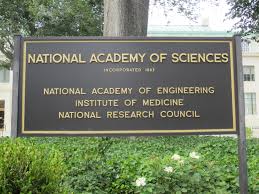by Jonathan Latham, PhD
The National Academy of Sciences needs to urgently address its one-sided work on GMOs say public-interest groups, farmer organisations, and academics. In a letter sent to the Academy’s president today, dozens of stakeholders drew attention to what they called a “troubling trend” at the prestigious scientific institution and its work on agricultural biotechnology.
The letter cites a lack of balance, perspective and independence among experts chosen to carry out a taxpayer-funded National Academy study. These experts will advise the federal government on how to overhaul regulations concerning GMOs—including novel biotechnology products developed using synthetic biology and other techniques, such as DNA “editing”. The new study is being conducted by the National Research Council’s (NRC) Committee on Future Biotechnology Products and Opportunities to Enhance Capabilities of the Biotechnology Regulatory System.

The Academy’s findings will likely shape how food is produced in the future. However, at least six of the 13 committee members chosen have financial conflicts of interests with the biotech industry, four of which are not publicly disclosed. Several other committee members have backgrounds advocating biotechnology development, including a representative of Dow AgroSciences and Richard Johnson of Global Helix LLC. Johnson, according to their report of 2014-2015, is also head of the United States Council for International Business committee on biotechnology.
The National Research Council’s work on this project meets the definition of a Federal Advisory Committee. According to the Federal Advisory Committee Act, government agencies can only use scientific opinions from the National Academy of Science if they emanate from “fairly balanced” committees. These should be free of conflicts of interests—“unless such conflict is promptly and publicly disclosed and the Academy determines that the conflict is unavoidable…”
In contrast to the large presence of industry supporters in the Academy’s work, no strong advocates of the precautionary principle or critics of industry practices were invited to participate as committee members, even though many were nominated. Likewise, no farmers or farmer groups—nor consumers or consumer groups—were invited, even though the focus of the Academy’s work is on agricultural biotechnology and food products.
The complaint comes on the heels of a Food & Water Watch report (Under the Influence: The National Research Council and GMOs) showing structural conflicts of interests at every level of the National Academy. The Academy receives millions of dollars in donations from biotech companies and allows industry representatives to sit on high-level boards overseeing operations.
For decades, scientists and public-interest groups have raised questions about conflicts of interest and potential bias in the Academy’s work on GMOs.
According to Tim Schwab, Senior Researcher at Food and Water Watch “Congress’s instructions are clearly designed to compel the Academy to avoid bias in its scientific work. The Academy cannot expect the public—or policy makers—to view its work as independent given how one-sided this scientific committee is.”
“If you are not at the table you are on the menu” says Allison Wilson, Science Director of the Bioscience Resource Project which is also a signatory to the letter.
If this article was useful to you please consider sharing it with your networks.



The system is rigged from the top down and in every part of our lives. When politicians in D.C. and state capitals are influenced by lobbiests and special interest, for them it seems acceptable while at the same time making rules, statutes, regulations and laws in the public interest and exempting themselves at the same time. Regulatory agencies, such as the EPA, FDA, Agriculture, etc. rubber stamp data and reports submitted by industry which are accepted by face value. The reason for this rubber stamping is simple, if you want to continue to be employed at the government, do not make any waves. If one makes waves, they are not consider a “multinational team player” because all these federal regulatory agencies have all been hijacked by the multinational corporations. The definition for the merger of corporate and government is, fascism, i.e., corporatism. Humanity and the environment does not stand a chance. I know because I have blown the whistle on fluoride in the form of Hydrofluorosilicic Acid (HFSA) an industrial hazardous waste by – product primarily from phosphate fertilizer and aluminum productions being sold to drinking water utilities for water fluoridation. This practice was approved on 30 March 1983 by Rebecca Hanmer, Deputy Assistance Administrator for Water, USEPA (1 page letter). What I have stated here is just one example of many to show how sinister and pervasive influence of the multinational corporations have become in every corner of government, resulting impacts on humanity and the environment.